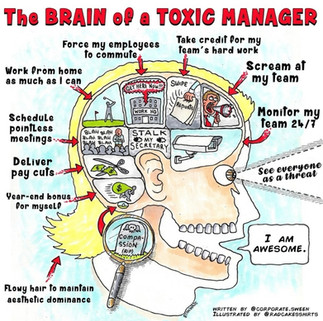Accountability: The Secret Sauce to Repairing a Toxic Work Culture
- Darryl Lovett
- Jun 4, 2024
- 3 min read
Why Workplace Culture Matters
The Reality of Toxic Cultures
Every day, countless memes and posts about toxic workplace cultures flood our social media feeds. This reflects a widespread issue—many employees are dissatisfied but hesitate to voice their concerns directly to leadership. Instead, they vent online, amplifying their frustrations while solutions remain elusive.
The Cost of Ignoring Issues
As leaders, we juggle numerous responsibilities, making it easy to overlook or ignore problems that negatively impact our organizational culture. However, this can lead to significant financial and reputational losses. It's crucial to ask ourselves: Are we making excuses instead of addressing these issues head-on?
A Story of Leadership Accountability Avoidance
Let me share a story illustrating the consequences of avoiding accountability.
I once worked for an organization led by a charismatic and innovative leader. However, this person had a significant blind spot: the organization's declining morale. It began subtly—a few disgruntled whispers here, a sigh of frustration there—but soon it became pervasive. Productivity dipped, creativity stagnated, and many team members either did the bare minimum or left, often not for better opportunities.
Despite sensing something was wrong, the leader adopted a laissez-faire approach, believing the issues would "work themselves out." As days and weeks passed, one of our top-producing colleagues left for an "I'm out of here" job, clearly stating it was due to the toxic culture. The leader dismissed this as an isolated case. Soon after, more people left, leaving the organization with multiple vacancies. The leader attributed this to market conditions rather than internal dissatisfaction.
Weeks turned into months, and the once-thriving organization was now struggling. Yet, the leader continued to avoid taking a deeper dive into the situation and accepting accountability, hoping the storm would pass without needing to make tough decisions or admit fault.
Finally, the tipping point came when a few more people spoke up about the toxic environment. At last, the leader had to confront the reality. It was a hard lesson, but I was not around long enough to see what changes were made.
This story vividly demonstrates how avoiding accountability can lead to a downward spiral, affecting morale, productivity, and ultimately, the success of an entire organization.
The Role of Leadership in Shaping Culture
Self-Reflection and Accountability
One of the toughest pills to swallow is recognizing that our leadership might be contributing to a negative culture. But here's the silver lining: we have the power to change it. It all begins with honest self-assessment and reflection. Are we truly holding ourselves accountable for our actions and their impact on our team?
Developing Accountability
Accountability isn't something you can pick up from a book or a course—it's a character trait that needs nurturing. It requires self-awareness, humility, and a genuine willingness to accept responsibility. Many adults struggle with this because it's easier to avoid blame or shift it elsewhere. But true leadership means embracing accountability, even when it's uncomfortable.
The Consequences of Avoiding Accountability
Throughout my career, I've witnessed firsthand how dodging accountability can exacerbate problems and foster toxic cultures. Leaders who fail to recognize realities and take necessary actions can significantly derail their team's morale, productivity, and overall culture.
Steps to Cultivate a Positive Culture
Emphasizing Transparency and Communication
To foster a positive culture, we must prioritize transparency, open communication, and mutual respect. This means moving away from placing blame and towards systematic changes that address root issues and empower employees.
Implementing Systematic Changes
Real change requires a genuine commitment to challenging ingrained beliefs and behaviors. Without this, it's like trying to patch a sinking boat with paper—ineffective, messy, and bound to fail. The result? Ongoing dysfunction, missed opportunities, and organizational stagnation or decline.
Take the leader in the story, for example. Their lack of accountability was a masterclass in denial. By the time they finally came around, the organization was already in shambles. Now, they faced a rebuilding situation, which might just have turned out to be a blessing in disguise. After all, there's nothing like a crisis to spark innovation and force much-needed changes. Maybe next time, they'll address problems before they become fires.
The Power of Accountability
A lack of accountability is a major factor in organizational failures. Identifying, addressing, and correcting it is far better than ignoring it and facing the consequences. Remember, accountability starts with you.
To Sum It Up
Changing a toxic culture isn't easy, but it's definitely worth the effort. By fostering accountability, transparency, and open communication, we can create a positive and productive work environment. Let's commit to holding ourselves accountable as leaders, leading by example, and making our workplaces better for everyone.










Comments